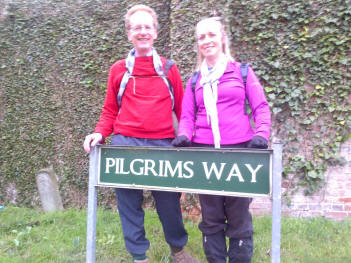Catholic Medical Quarterly Volume 73(3) August 2023
Lessons from 7th Century England, St Bede and the Real Presence.
Recounted by Adrian Treloar
 St Bede tells us that the Mediaeval seat of the English Catholic Church
was in Canterbury and not in London because of the resolute protection of
Catholic teaching on the Blessed Sacrament and intercommunion. Bishop
Mellitus sacrificed (in conscience) the conversion of London to protect
the Blessed Sacrament from abuse.
St Bede tells us that the Mediaeval seat of the English Catholic Church
was in Canterbury and not in London because of the resolute protection of
Catholic teaching on the Blessed Sacrament and intercommunion. Bishop
Mellitus sacrificed (in conscience) the conversion of London to protect
the Blessed Sacrament from abuse.
In 731 the Venerable Bede wrote “Historica Eccelsiastica Gentis Angelorum” (The Ecclesiastical History of the English People).
He wrote “In the year of Our Lord 604, Augustine, Archbishop of Britain ordained.... [bishop] Mellitus to preach to the province of the East Saxons , who are divided from Kent by the river Thames and border on the Eastern Sea. Their metropolis is the city of London, which is situated on the bank of the aforesaid river, and is the mart of many nations resorting to it by seaand land. At that time, Sebert, nephew to Ethelbert through his sister Ricula, reigned over the nation, though he was under subjection to Ethelbert, who as has been said above, had command over all the peoples of England as far as the Humber. But when the province also received the word of truth, by the preaching of Mellitus, King Ethelbert built the Church of St Paul the Apostle in the City of London, where he and his successors should have their episcopal See.....”
Clearly therefore, it was intended to establish the seat of the Church in London and not Canterbury. But Bede continues.... “In the Year of Our Lord 616... the death of Sabert, king of the East Saxons... left three sons to inherit his temporal crown. They immediately began to openly give themselves up to idolatry, which, during their father’s lifetime they had seemed somewhat to abandon, and they granted free license to their subjects to serve idols. And when they saw the bishop [Mellitus), whilst celebrating Mass in the church, give the Eucharist to the people, filled, as they were with folly and ignorance, they said to him, as is commonly reported, ‘Why do you not give us also that white bread, which you used to give to our father Saba’ (for so they were wont to call him). To whom he answered, ‘If you will be washed in that font of salvation, in which your father was washed, you may also partake of the holy Bread of which he partook; but if you despise the lover of life, you can in no wise receive the Bread of life.’ They replied ‘We will not enter into that font, because we know that we do not stand in need of it, and yet we will be refreshed by that bread.’
And being often earnestly admonished by him, that this could by no means be done, nor would anyone be admitted to partake of the sacred Oblation without the holy cleansing [Baptism], at last, they filled with rage, ‘If you will not comply with us in so small a matter as that which we require, you shall not stay in our province’. And they drove him from their kingdom.
Bede records that Mellitus was forced to flee to Gaul. But at the insistence of St Lawrence, Mellitus returned to London. Bede then records that “But the people of London would not receive Bishop Mellitus, choosing rather to be under their idolatrous high priests, for King Eabald {the Saxon overlord of southern and mid England] had not so much authority in the kingdom as his father, and was not able to restore the bishop to his church against the will and consent of the pagans.”
And so it was that London denied Christianity and was not a place where, as he wanted to, Augustine could establish the see of England. The insistence by Bishop Mellitus that the Sacred Host could not be given to those that were not Baptised, led to his rejection and hounding out of London. Such independence of mind is probably characteristic of Londoners. And it was not until 675 that London was converted. Meanwhile, seeing the paganism of London and the impossibility of establishing Londinium [London] as the seat of the Primate of England the Church had established its seat in Canterbury. That is unlike almost every other great nation which has the capital as the seat of its primate.
The Church gives the deepest respect (and protection) to the Sacred Host, which is of course the Body of Christ. Therefore, those who are not baptised or who are not living in a state of grace may not receive it. And the Church paid a high price in 616, being willing to “lose” London to protect Jesus in the Blessed Sacrament.
A reflection
 In January 2016 I walked the Pilgrims’ Way from Winchester to
Canterbury. With 155 miles and 8 days to reflect upon the faith of my many
forbears there was much that could be written down. So it was that, in
2016 I walked, as had St Thomas à Becket before me, into Canterbury
Cathedral. In the quiet of the evening, I knelt and prayed where he was
martyred. In the mediaeval seat of the Catholic Church in England.
In January 2016 I walked the Pilgrims’ Way from Winchester to
Canterbury. With 155 miles and 8 days to reflect upon the faith of my many
forbears there was much that could be written down. So it was that, in
2016 I walked, as had St Thomas à Becket before me, into Canterbury
Cathedral. In the quiet of the evening, I knelt and prayed where he was
martyred. In the mediaeval seat of the Catholic Church in England.
Walking along, I was continually struck by the devotion and commitment to faith of so many forbears who walked with poor clothes, in wet rains and poor or no footwear to Canterbury. That commitment to faith and a determination to Our Lord is a thing only seen nowadays in war torn places and places of persecution like Syria and Iraq. In the West, there are few signs left of fervour and or of any willingness to sacrifice for our faith, and for Our Lord. In the peaceful tramp tramp of walking we can pray, and look forward to a reward (for me it was Canterbury Cathedral). But we can also build that resolve to one day, hope in our Resurrection and to live with “Our” Lord.
 Many have died and suffered penury for their faith. St Thomas a Becket
died because of his defence of the faith and our Church. St Thomas More
did not die defending Papal authority in the abstract. He died defending
Papal authority on marriage and family life.
Many have died and suffered penury for their faith. St Thomas a Becket
died because of his defence of the faith and our Church. St Thomas More
did not die defending Papal authority in the abstract. He died defending
Papal authority on marriage and family life.
And back at work after a week’s walking I was reminded that we must, at times, be resolute in defence of key and central moral tenets. First and foremost for the protection of our patients. And at times, in conscience, that may mean following the example of the early Catholic Church in England which sacrificed the conversion of the entirety of London rather than compromise the Ten Commandments or the dignity of the Blessed Sacrament. For us, at work, the compromises requested are of course around medical ethics. But the call to conscience and truth is the same call which Bishop Mellitus so resolutely responded to.
